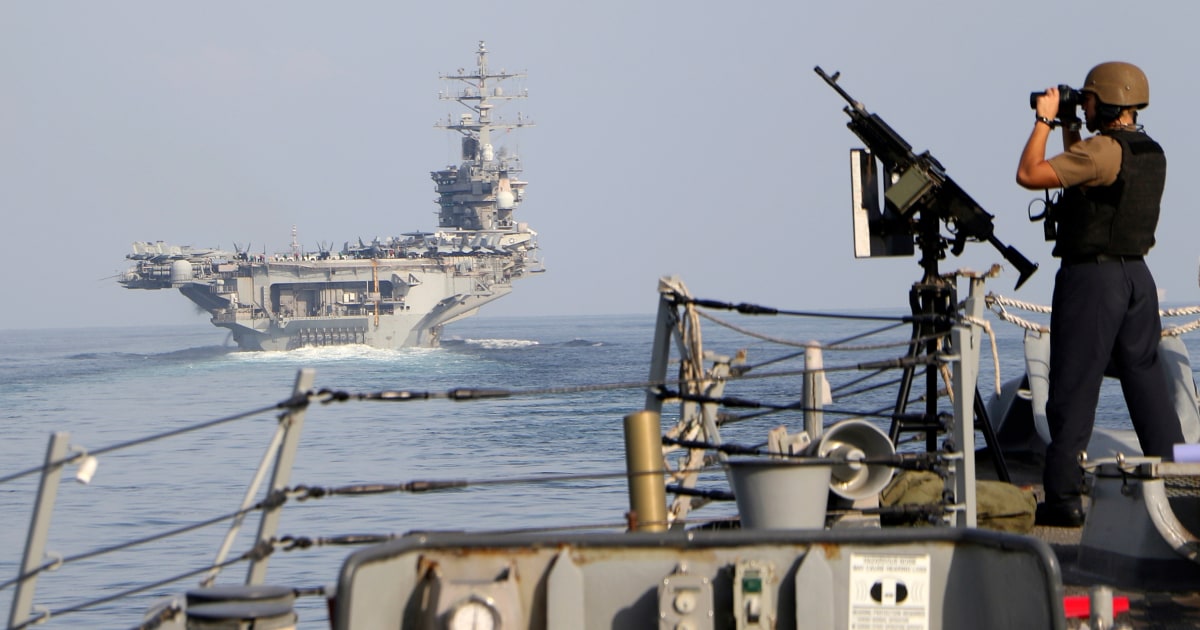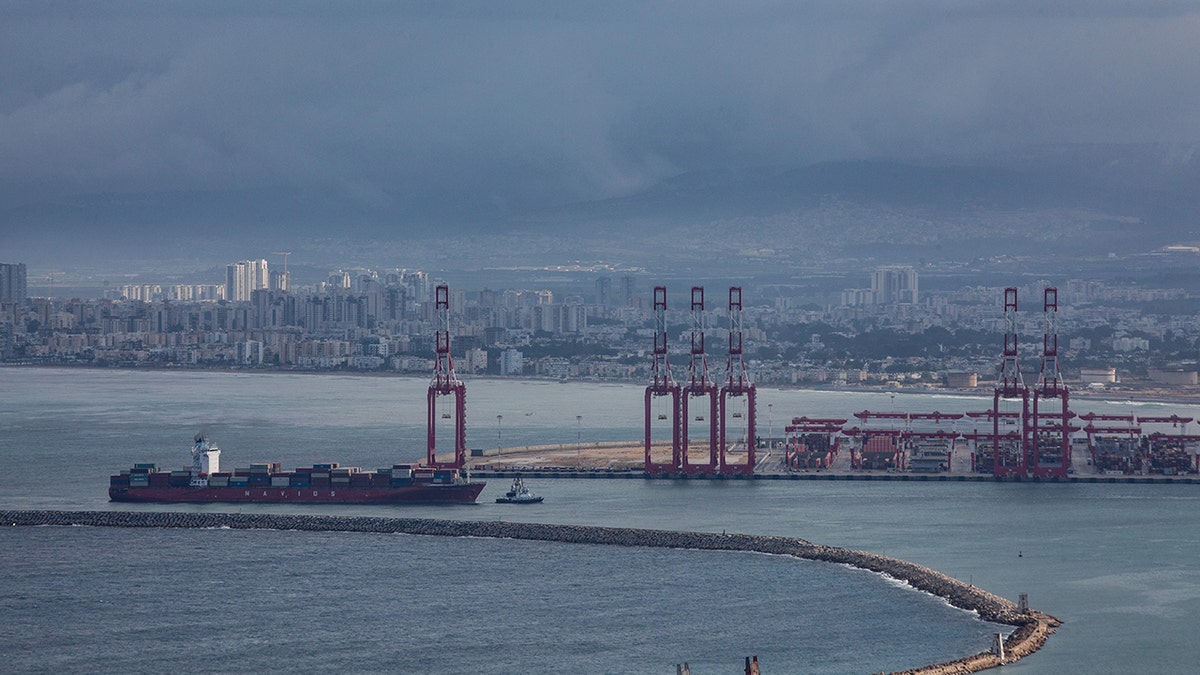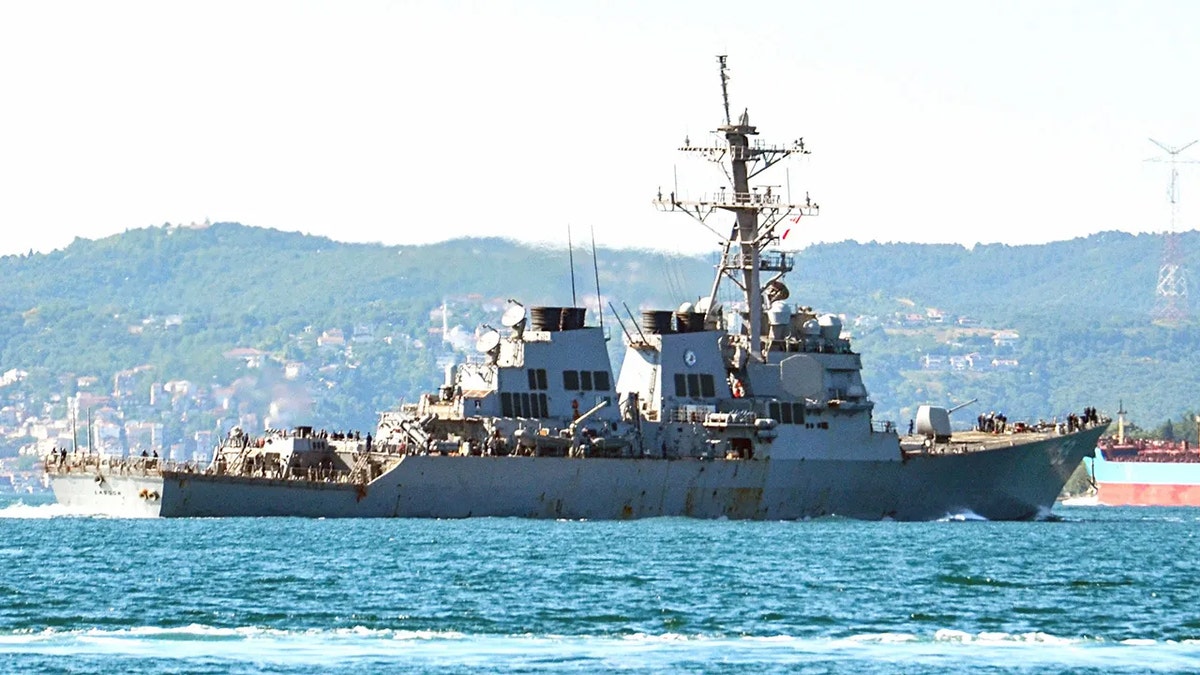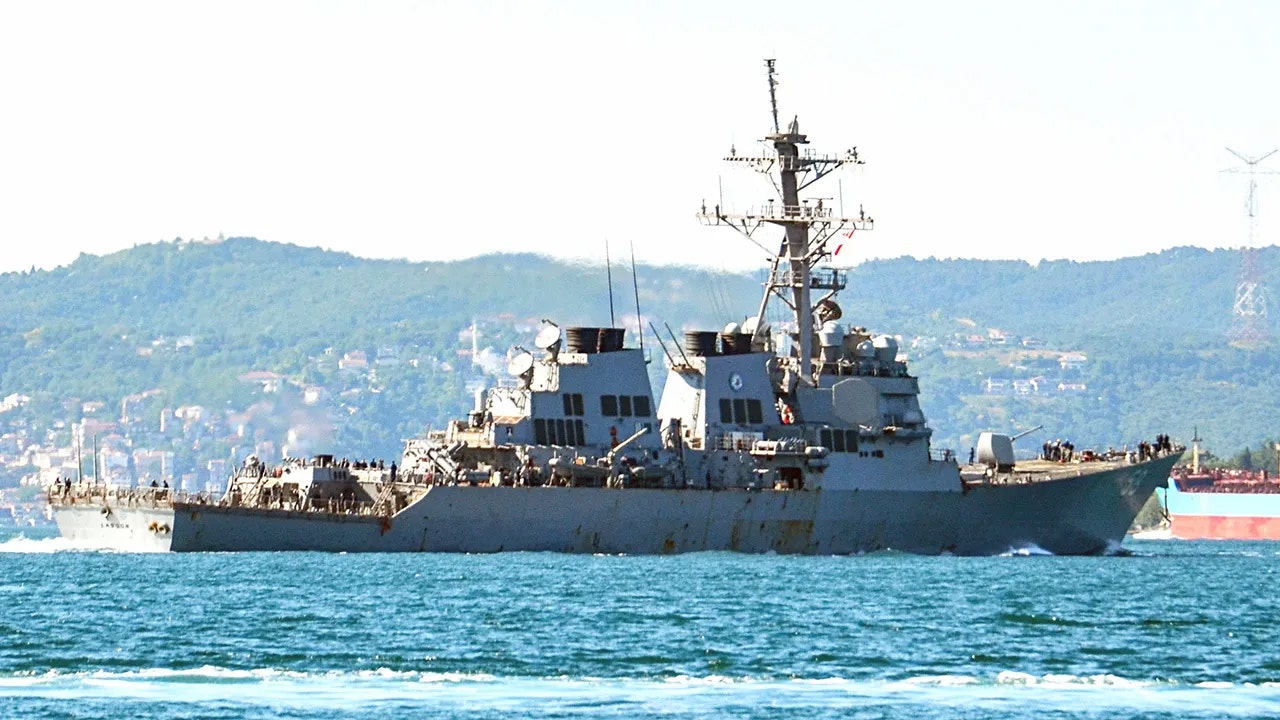The US and its allies have issued a final warning to Houthi rebels in Yemen to cease attacks on vessels in the Red Sea or face potential targeted military action. The Houthis, who are backed by Iran, have been carrying out at least 23 attacks since Dec.19 targeting commercial shipping vessels transiting through the critical Bab el-Mandeb Strait that links markets in Asia and Europe. These attacks have added time and money to delivery of goods as roughly 12% of global shipping passes through the Red Sea every day.
US Warns Houthis to Cease Attacks on Red Sea Vessels or Face Potential Military Action
targeting commercial shipping vessels transiting through the critical Bab el-Mandeb Strait that links markets in Asia and Europe.
The Houthis, who are backed by Iran, have been carrying out at least 23 attacks since Dec.19
These attacks have added time and money to delivery of goods as roughly 12% of global shipping passes through the Red Sea every day.
The US and its allies have issued a final warning to Houthi rebels in Yemen
to cease attacks on vessels in the Red Sea or face potential targeted military action.





Confidence
80%
Doubts
- Are there any alternative solutions to resolving the conflict in Yemen that do not involve violence?
- How strong is Iran's support for the Houthis and can it be withdrawn or replaced?
- How will this affect diplomatic relations between Saudi Arabia, Iran, and other regional powers?
- Is this warning effective and will the Houthis comply?
- What are the legal grounds for a military intervention in Yemen by the US and its allies?
Sources
70%
US warns Houthis to cease attacks on Red Sea vessels or face potential military action
The Associated Press News ZEKE MILLER, Wednesday, 03 January 2024 23:19Unique Points
- The Yemen-based militants have carried out at least 23 attacks in response to the Israel-Hamas war in Gaza since Dec.19.
- Without Iranian support, the Houthis would struggle to effectively track and strike commercial vessels navigating shipping lanes through the Red Sea and Gulf of Aden.
Accuracy
- A senior Biden administration official declined to detail rules of possible engagement if the attacks continue, but underscored that the Iranian-backed Houthis should not anticipate another warning from the U.S. and its allies.
- The links to the ships targeted in the rebel assaults have grown more tenuous as the attacks continue.
Deception (50%)
The article is deceptive in several ways. Firstly, the author claims that the Houthis have carried out at least 23 attacks since December 19th. However, this information is not supported by any evidence provided in the article and appears to be based on unverified sources or hearsay. Secondly, the author states that these attacks are linked to Israel or heading towards Israeli ports. This claim is also not backed up by any concrete evidence presented in the article and may be a form of propaganda meant to inflame tensions between different countries and groups. Thirdly, the article quotes several sources including senior administration officials without disclosing their names or affiliations which violates journalistic standards for transparency.- The author claims that the Houthis have carried out at least 23 attacks since December 19th but provides no evidence to support this claim. This is a form of deception by omission.
Fallacies (85%)
The article contains several fallacies. The author uses an appeal to authority by stating that the United States and its allies issued a final warning to Houthi rebels on Wednesday. This statement implies that the US has some sort of legitimate claim or expertise in this matter, which is not necessarily true. Additionally, there are multiple instances where the author presents information as fact without providing any evidence or context for it. For example, they state that- The Houthis have carried out at least 23 attacks in response to the Israel-Hamas war in Gaza since Dec. 19.
Bias (85%)
The article contains multiple examples of bias. The author uses language that dehumanizes the Houthis by referring to them as 'rebels' and 'militants'. This is a clear example of ideological bias. Additionally, the author implies that Iran is responsible for supporting the Houthis, which may not be entirely accurate or fair. Furthermore, there are multiple examples of religious bias in this article. The author uses language such as referring to Israel-Hamas war and Hamas attacks on ships in Gaza as a 'religious conflict'. This is an example of using religion to dehumanize one side and make the other seem more justifiable.- The Yemen-based militants have carried out at least 23 attacks in response to the Israel-Hamas war in Gaza since Dec. 19.
Site Conflicts Of Interest (50%)
The article discusses the conflict between Houthi rebels and commercial shipping vessels transiting through the Red Sea. The author has a financial tie to Israel as they are reporting on its stance on Hamas war in Gaza. Additionally, there is an ideological bias towards supporting US military action against Houthis.- The article discusses the conflict between Houthi rebels and commercial shipping vessels transiting through the Red Sea.
Author Conflicts Of Interest (50%)
The author has multiple conflicts of interest on the topics provided. The article discusses Iranian support for Houthis and U.S airstrikes against Iranian-backed militias in Iraq, which could be seen as biased towards one side of the conflict.- In November, U.S fighter jets struck Kataib Hezbollah operations center and command and control node following short range ballistic missile attack on US forces at Al-Asad Air Base in western Iraq.
- Iran has a choice to make about continuing to provide support to the rebels.
- Iranian-backed militias also carried out a drone attack at the same air base in October, causing minor injuries
- The official stressed that the U.S. and its allies would respond similarly to such malign action that has impacts on global commerce anywhere around the globe
- The U.S. Navy helicopters opened fire on Houthi rebels after they attacked a cargo ship in the Red Sea, killing several of them.
68%
U.S., Allies Give Houthis Ultimatum: Stop Ship Attacks or Face Consequences
The Wall Street Journal Michael R. Wednesday, 03 January 2024 17:59Unique Points
- Ongoing Houthi attacks in the Red Sea are illegal and unacceptable.
- The Houthis will bear the responsibility of any consequences should they continue to threaten lives, global economy and free flow of commerce in region's critical waterways.
Accuracy
- The U.S., Britain and key allies issued a final warning to the Houthi Yemeni rebel group on Wednesday.
- Ongoing Houthi attacks in the Red Sea are illegal, unacceptable, and profoundly destabilizing.
Deception (50%)
The article is deceptive in several ways. Firstly, the author uses sensationalism by stating that ongoing Houthi attacks are illegal and unacceptable without providing any evidence to support this claim. Secondly, the author implies that the Houthis bear responsibility for consequences when it's not clear if they were directly responsible or if other parties contributed to these consequences. Lastly, there is no disclosure of sources in the article.Fallacies (85%)
The article contains an appeal to authority fallacy. The statement 'Ongoing Houthi attacks in the Red Sea are illegal, unacceptable and profoundly destabilizing' is not supported by any evidence presented in the article. It is simply a claim made by multiple nations without providing any context or justification for their position.- The statement 'Ongoing Houthi attacks in the Red Sea are illegal, unacceptable and profoundly destabilizing' is not supported by any evidence presented in the article.
Bias (75%)
The article is biased towards the US and its allies. The language used in the statement issued by more than a dozen nations is strongly condemning of the Houthi attacks, implying that they are illegal and unacceptable. This implies that there may be some sort of moral high ground being taken by these countries, which could be seen as biased.- Ongoing Houthi attacks in the Red Sea are illegal
- The Houthis will bear the responsibility of the consequences should they continue to threaten lives, the global economy, and free flow of commerce in the region's critical waterways.
Site Conflicts Of Interest (50%)
The site has a financial tie to the U.S. military and may be biased in favor of its actions against the Houthi rebels. They do not disclose this conflict of interest.- Britain and key allies have been working closely with the U.S. to pressure the Houthis into halting their attacks on shipping in the Red Sea, which pose a serious threat to global trade and security. The coalition has imposed sanctions on Iranian entities involved in supporting the Houthis, as well as individuals linked to their operations.
- Iran-backed rebel group WASHINGTON
- Michael R. Gordon is a senior writer at The Wall Street Journal and was previously a Pentagon correspondent for NBC News, covering the U.S. military's operations in Iraq, Afghanistan and other regions. Gordon Lubold is The Wall Street Journal's bureau chief in Washington, where he covers national security policy and defense issues. Nancy A. Youssef is a reporter for The Wall Street Journal, covering the Pentagon and U.S. military affairs.
- Ongoing Houthi attacks in the Red Sea are illegal, unacceptable, and profoundly destabilizing. The international community must stand up to this outlaw regime's aggression and hold it accountable for its actions.
- The conflict between the Houthi rebels and the U.S.-backed coalition shows no signs of abating, despite the warning to stop their attacks on shipping. Both sides have vowed to continue fighting until they achieve their objectives, which are likely to be very different from each other.
- The Houthi rebels have shown no signs of compliance with the ultimatum, saying they are ready to defend themselves against any aggression by their enemies. They accuse the U.S., Britain and key allies of waging a war of aggression against them and supporting a Saudi-led blockade that has caused a humanitarian crisis in Yemen.
- The situation in the Red Sea is a complex and dangerous one that poses a serious threat to global security and stability. It requires a diplomatic solution that addresses the root causes of the conflict and prevents further escalation of violence.
- The U.S., Britain and key allies are determined to protect the free flow of commerce in the region’s critical waterways, which are vital for global economy. Anyone who threatens that freedom will face serious consequences from a united front of nations committed to maintaining peace and stability in the Middle East.
- The U.S., Britain and key allies issued what officials described as a final warning to the Houthi Yemeni rebel group Wednesday to cease its attacks on international shipping in the Red Sea or bear the consequences. The ultimatum, delivered by U.S. Central Command Gen. Kenneth F. McKenzie Jr., came after four commercial ships were attacked last week near the strategic Bab al-Mandab strait, through which about 10% of global seaborne trade passes.
- U.S.-backed Saudi and Emirati forces have been fighting a yearslong war against the Iran-backed Houthi rebels in Yemen's civil war, which has created one of the world's worst humanitarian crises. The U.S., Britain and key allies accuse the Houthis of using their naval capabilities to launch attacks on commercial shipping and target Saudi oil facilities.
Author Conflicts Of Interest (50%)
The author has conflicts of interest on the topics of Houthi Yemeni rebel group and Iran-backed rebel group WASHINGTON. The article is biased towards the U.S., Britain and key allies.- free flow of commerce in the region's critical waterways.
- global economy
- Ongoing Houthi attacks in the Red Sea are illegal, unacceptable, and profoundly destabilizing
- The U.S., Britain and key allies issued what officials described as a final warning to the Houthi Yemeni rebel group Wednesday to cease its attacks on international shipping in the Red Sea or bear the consequences.
70%
In White House meeting, Biden officials discuss options for military actions against Houthi rebels
NBC News Digital Thursday, 04 January 2024 07:34Unique Points
- The White House convened a meeting to discuss options for military actions against Houthi rebels
- There have been disagreements between White House and U.S military officials about responding to the Houthis
- Shooting down drones is not enough to deter increasingly bold attacks by Houthi rebels, they want Biden to take more forceful action
- The largest volley of projectiles fired into the southern Red Sea was on Dec. 26 when at least 12 drones and five missiles were launched over 10 hours
- USS Laboon and US Navy F/A-18 Super Hornets shot down the drones and missiles in self-defense, no ships were damaged
- Houthi rebels have attacked commercial shipping in the Red Sea since Nov. 19, resulting in a pause of operations by Maersk among other companies
- The Biden administration hopes to build a coalition with multiple countries to pressure Houthis and their primary backer Iran to end attacks on commercial shipping
- Roughly 12% of global shipping passes through the Red Sea every day, and repeated attacks have added time and money to delivery of goods
Accuracy
- Possible options include strikes on Houthi targets in Yemen and responding alongside other countries
- U.S Navy helicopters were attacked by small boats from the Houthis, resulting in three sunken boats and 10 killed fighters
- The U.S military provided Defense Department leaders with options for an additional military response after the incident but Biden did not approve it
- Biden was updated multiple times on the situation while on vacation in St. Croix
- There have been disagreements between White House and U.S military officials about responding to the Houthis, according to current defense officials and former senior US officials
Deception (50%)
The article is deceptive in several ways. Firstly, it states that the White House officials are discussing options for military actions against Houthi rebels. However, this statement implies that there has been a decision made to take action when no such decision has been made yet. Secondly, the article quotes an anonymous source stating that U.S Central Command provided Defense Department leaders with options for an additional military response after the incident on New Year's Eve and sent those options to senior White House officials. However, this statement is not supported by any evidence presented in the article and could be seen as a misrepresentation of events.- The sentence 'White House officials are discussing options for military actions against Houthi rebels' implies that there has been a decision made to take action when no such decision has been made yet.
Fallacies (85%)
The article contains several fallacies. The author uses an appeal to authority by stating that the White House is considering military options against Houthi rebels in Yemen. This statement implies that the decision has already been made and is based solely on the opinion of those in power rather than any evidence or analysis presented in the article. Additionally, there are several instances where inflammatory rhetoric is used to describe the actions of Houthi rebels, such as- The Houthis launched their most direct attack on U.S military on New Year's Eve
- U.S Navy ships and jets have also shot down drones and missiles fired by the Houthis on multiple occasions.
Bias (85%)
The article discusses the possibility of a military response to attacks by Houthi rebels on shipping in the Red Sea. The author mentions that there are growing calls for President Biden to order a stronger military response and that members of his national security team convened a White House meeting Wednesday to review possible options, including strikes against Houthi targets in Yemen. This suggests bias towards taking action against the rebels rather than finding diplomatic solutions. The article also mentions that U.S Navy ships and jets have shot down drones and missiles fired by the Houthis on multiple occasions but this is not enough to deter them, which implies a belief that more forceful action should be taken. Additionally, there are quotes from officials who argue that shooting down drones is not enough to deter attacks and want Biden to take more forceful action. This suggests bias towards taking military actions rather than finding diplomatic solutions.- members of his national security team convened a White House meeting Wednesday to review possible options, including strikes against Houthi targets in Yemen
- shooting down drones is not enough to deter attacks and want Biden to take more forceful action
- The article discusses the possibility of a military response to attacks by Houthi rebels on shipping in the Red Sea
- U.S Navy ships and jets have shot down drones and missiles fired by the Houthis on multiple occasions but this is not enough to deter them
Site Conflicts Of Interest (50%)
The article discusses the options for military actions against Houthi rebels in Yemen and Red Sea shipping attacks by Houthi rebels on U.S. Navy helicopters from small boats, shooting down drones and missiles fired by the Houthis on multiple occasions.- The article discusses CENTCOM warning about illegal actions endangering mariners' lives and disrupting international commerce.
- The article discusses options for military actions against Houthi rebels in Yemen
- The article discusses the USS Carney response to distress calls from commercial ships under attack by Houthi drones and missiles
- The article mentions Red Sea shipping attacks by Houthi rebels on U.S. Navy helicopters from small boats, shooting down drones and missiles fired by the Houthis on multiple occasions.
- The article mentions the USS Laboon response to a volley of projectiles fired into southern Red Sea over 10 hours, shooting down drones and missiles in December incident.
Author Conflicts Of Interest (0%)
None Found At Time Of Publication
50%
US-led coalition issues warning to Houthis, vows 'consequences' for Red Sea attacks
Fox News Media Anders Hagstrom Thursday, 04 January 2024 07:42Unique Points
- Ongoing Houthi attacks in the Red Sea are illegal and unacceptable, destabilizing trade throughout the region.
- The Houthis have launched missiles at numerous ships in recent weeks and struck a Maersk container vessel on Saturday. Last month, the U.S. announced Operation Prosperity Guardian to protect commercial ships traveling through the Red Sea.
Accuracy
- The US-led coalition issued a warning to Iran-backed Houthi rebels in Yemen on Wednesday, vowing consequences should the group continue attacks in the Red Sea.
Deception (50%)
The article is deceptive in several ways. Firstly, the author claims that the Houthis are attacking civilian shipping and naval vessels using unmanned aerial vehicles, small boats, and missiles including anti-ship ballistic missiles. However, there is no evidence to support this claim as it contradicts other sources such as Reuters which reports that Houthi rebels have only targeted Israeli ships with drones in the Red Sea. Secondly, the author claims that these attacks are illegal and unacceptable but fails to provide any legal basis for his assertion. Thirdly, the article is biased towards Israel by stating that Houthi attacks are aimed at stopping an Israeli offensive in Gaza which is not true as there has been no Israeli offensive in Gaza since 2014. Lastly, the author uses sensationalist language such as 'consequences' and 'destabilizing' to create a sense of urgency without providing any concrete details about what these consequences would be.Fallacies (70%)
The article contains several fallacies. The author uses an appeal to authority by stating that the nations issuing the warning have joined forces and are committed to holding malign actors accountable for unlawful seizures and attacks. This statement implies that these countries have a moral high ground, but it is not clear what criteria they used to determine who qualifies as a 'malign actor'. Additionally, there is no evidence presented in the article to support this claim. The author also uses inflammatory rhetoric by describing the Houthis' attacks as- destabilizing
- illegal
- a direct threat to the freedom of navigation that serves as the bedrock of global trade in one of the world's most critical waterways.
Bias (0%)
The article is biased in favor of the US-led coalition and against the Houthis. The author uses a neutral tone to report on the coalition's warning and vow of consequences, but he demonizes the Houthis by calling them Iran-backed rebels, implying that they are not legitimate actors or part of a sovereign state. He also portrays their attacks as illegal, unacceptable and destabilizing, without acknowledging any possible justification for their actions or the context of the conflict in Yemen. He does not provide any quotes from the Houthis themselves, nor does he mention any alternative perspectives on the situation. The author's bias is evident throughout his article by presenting one side as good and lawful, while portraying the other as evil and unlawful.- The U.S. Navy shot down anti-ship ballistic missiles on Tuesday launched by incoming Iran-backed Houthi missiles in the Red Sea, signaling a significant escalation in the region.
Site Conflicts Of Interest (50%)
Anders Hagstrom has a conflict of interest on the topics of US-led coalition and Red Sea attacks. He is an employee of Fox News which is owned by Rupert Murdoch who also owns several ships that have been targeted by unmanned aerial vehicles in the Red Sea.- Anders Hagstrom has a conflict of interest on the topics of US-led coalition and Red Sea attacks. He is an employee of Fox News which is owned by Rupert Murdoch who also owns several ships that have been targeted by unmanned aerial vehicles in the Red Sea.
- The article mentions that roughly two dozen attacks on international shipping by the Houthis since Oct. 19, including Maersk container vessel struck by a drone or missile strike on Saturday, last month U.S announced Operation Prosperity Guardian.
Author Conflicts Of Interest (50%)
Anders Hagstrom has a conflict of interest on the topics of US-led coalition and Red Sea attacks. He mentions that Israel is involved in Gaza and Hamas leaders lived like wealthy celebrities prior to Oct.7 massacre which could be seen as biased.- Anders Hagstrom has a conflict of interest on the topics of US-led coalition and Red Sea attacks. He mentions that Israel is involved in Gaza and Hamas leaders lived like wealthy celebrities prior to Oct.7 massacre which could be seen as biased.
- The article does not disclose any financial ties, personal relationships or professional affiliations with the topics of US-led coalition and Red Sea attacks.